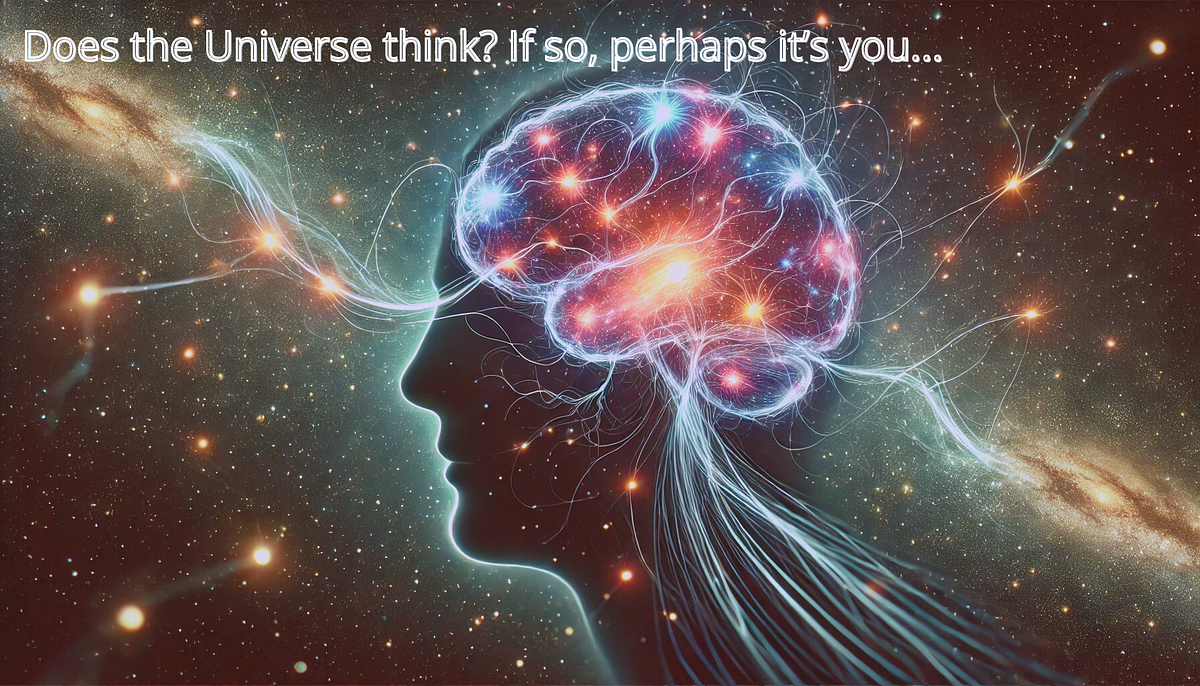Does the Universe think? If so, perhaps it’s you…
Does the Universe think? If so, perhaps it’s you…

Is the Universe capable of thinking? Sabine Hossenfelder explores this question in one of her videos, which made me think as well…
The first question is how we define “thinking” or perhaps even “consciousness.” These concepts are still hotly debated, but a common consensus is that thinking involves some form of information processing. For such processing to occur, information must be transmitted. Here, physics provides a crucial boundary: according to Einstein’s theory of relativity, information cannot travel faster than the speed of light. This creates a natural limit for any structure capable of thought. If something is too vast, the slow pace of information transmission makes thinking impossible or reduces it to an extraordinarily sluggish process.
Similarly, there is also a lower limit to the capacity for thought, as the smallest possible unit for storing information might be an elementary particle. However, stable information storage requires structures significantly larger than atoms, due to the disruptive effects of environmental noise. This helps explain why humans — and thinking life in general — exist within a middle range of scales, rather than at the extremes.
At first glance, it might seem logical to dismiss the idea of a thinking Universe based on these limitations. However, as Sabine points out in her video, there are a few intriguing loopholes to consider.
One such loophole involves the speed of light, which limits motion through space, but space itself isn’t necessarily uniform or static. Science fiction fans might immediately think of wormholes — hypothetical shortcuts that connect two distant points in space. Unlike a tunnel with a defined length, a wormhole is more like a unique curvature of space. For example, traveling left might take 10 light-years to reach the nearest star, while a shortcut to the right could take just 1 light-minute.
Although no wormholes have been discovered yet, their existence hasn’t been ruled out. The Universe may be teeming with them, but they’re so minuscule that we’re unable to detect them. If wormholes do exist, they might allow information to travel through them. Perhaps the Universe has a hidden “nervous system” intricately woven through our reality — one we’re completely unaware of.
Another intriguing loophole is that the theory of relativity doesn’t entirely rule out the possibility of speeds exceeding the speed of light. It simply states that anything moving slower than light cannot be accelerated to surpass it. However, it doesn’t exclude the existence of particles that inherently travel faster than light. These hypothetical particles, known as tachyons, move faster than light and cannot be slowed down to sub-light speeds.
This leaves room for speculation. The Universe might have a “nervous system” composed of microscopic wormholes or even a tachyon-based brain (which admittedly sounds cooler than a positronic brain). In this sense, the laws of physics don’t completely rule out the possibility that the Universe could think.
That said, even if the Universe is capable of thought, the question remains: could it know anything about us? It’s highly unlikely that our existence would hold any significance for a thinking Universe, or that its thoughts would have any direct impact on us. For those seeking evidence of God, this concept is probably not the answer. A thinking Universe doesn’t align with traditional notions of divinity.
However, for those who started reading this with that hope in mind, don’t give up just yet — let’s explore a further line of reasoning.
Sabine approached the question by starting with the laws of physics, exploring whether consciousness could arise as an emergent property. But what if we flipped the perspective? What if consciousness is fundamental, and the laws of physics are emergent phenomena?
What if the Universe itself is a brain — a vast, thinking structure experiencing a massive case of dissociative identity disorder, imagining itself as billions of individual humans? In this scenario, physical reality and the world around us would simply be an interface connecting these fragmented consciousnesses. There are no atoms, no galaxies, etc. only interconnected minds. This idea is impossible to disprove because any experiment we conduct would inevitably align with the laws of physics as our consciousness expects them to.
Yes, I’m alluding to the classic simulation hypothesis. If you’re curious to dive deeper into this concept, feel free to check out my previous article on the subject.
Some days ago, I read an article on arXiv from Vitaly Vanchurin about ‘The world as a neural network’.medium.com
A common counterargument to the simulation hypothesis is, “Alright, but who built the computer running the simulation?”
The answer is surprisingly simple: there is no computer (just as “there is no spoon” from The Matrix). Much like the prevailing scientific view that the Universe emerged from nothing, a “Brain Universe” — a vast thinking structure — could also have spontaneously arisen from nothing. In this Universe, it wasn’t galaxies and stars that gradually formed, but rather thoughts and consciousnesses.
I’ve explored this idea in greater depth in another article. If you’re curious, you can read it here:
As we wrap up this article, the question remains unanswered — we still don’t know whether the Universe is capable of thought. However, along the way, we’ve explored a variety of intriguing ideas, some of which may even transcend the original question.